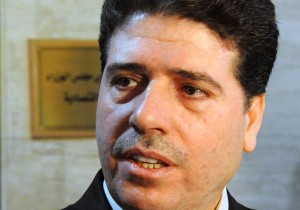Syrian PM survives bomb attack in capital

In this photo released by the Syrian official news agency SANA, Syrian Prime Minister Wael al-Halqi, who his convoy attacked by bomb, speaks to journalists after an economic meeting, in Damascus, Syria, April 29, 2013. Syria’s prime minister escaped an assassination attempt Monday when a bomb went off near his convoy in Damascus, state media reported. AP PHOTO/SANA
DAMASCUS—Syrian Prime Minister Wael al-Halqi escaped an assassination bid on Monday, surviving a blast against his convoy in Damascus, in the latest attack on top members of President Bashar al-Assad’s regime.
Soon after, the Syrian Observatory for Human Rights reported an air raid on Halqi’s hometown of Jassem, in the country’s south, killed 11 people including eight rebel fighters.
The attacks came as UN chief Ban Ki-moon issued a new plea to Damascus to stop blocking an international inquiry into the alleged use of chemical weapons and Republican lawmakers in the United States stepped up calls for American action on the claims.
Syrian state television said Halqi was unharmed in the blast in the upmarket Damascus neighborhood of Mazzeh.
“The terrorist explosion in Mazzeh was an attempt to target the prime minister’s convoy and Dr. Wael al-Halqi was unharmed,” the television reported, adding the blast had caused casualties.
Article continues after this advertisement6 people killed
Article continues after this advertisementThe Observatory said the blast killed six people including one of Halqi’s bodyguards.
“A second bodyguard and the driver are in critical condition,” its director Rami Abdel Rahman told AFP, adding the convoy appeared to have been targeted by a remotely detonated car bomb.
State television said the explosion happened near a public garden and a school in Mazzeh, a well-secured district home to embassies, government buildings, intelligence facilities and politicians.
“I was walking on the street when suddenly there was a very powerful explosion and I saw a car burning and people running,” a young man told AFP at the scene.
“I heard glass shattering,” he added, saying he had tried to hide for fear a second explosion would follow.
An AFP photographer at the scene said vehicles were destroyed, including a bus that was burned out. The windshields of other cars nearby were also blown out.
Footage of Halqi
The official Al-Ikhbariya television station aired footage of Halqi attending a government meeting and giving a statement afterwards, but it was unclear whether the footage was from before or after the attack.
A news bulletin quoted Halqi as saying “these types of attacks are nothing but proof of the discouragement and despair of the terrorist groups as a result of the actions of the Syrian army.”
Halqi, who was appointed prime minister in August 2012 after his predecessor, Riad Hijab, defected to the opposition, is the latest in a growing list of regime officials to be targeted for assassination.
In July 2012, a suicide bomb attack killed Syria’s defense minister and deputy defense minister and seriously wounded the interior minister.
The capital has also been targeted in major bombings, including one in the center of the city, which killed at least 15 people on April 9.
Assad’s forces also clashed on Monday with rebels near Damascus international airport and in surrounding villages, said the Observatory.
Fighting on highway
A security source reported fighting with a small armed group on the highway leading to the airport early in the morning, forcing the closure of the road.
The attack against Halqi came as US Republican lawmakers piled pressure on the administration to take action over Syria’s alleged use of chemical weapons.
But despite the criticism of President Barack Obama’s failure to do more, there was little agreement on precisely how the United States should act.
“We need to get involved. And there’s a growing consensus in the US Senate that the United States should get involved,” Republican Senator Lindsey Graham said.
But he acknowledged that “Syria is difficult,” and any action would be risky.
Consensus elusive
And international consensus remains elusive, with Russia standing by Assad and warning a search for weapons of mass destruction should not be used to oust Assad.
“There are governments and outside players that believe that all means are appropriate to overthrow the Syrian regime,” said Russian Foreign Minister Sergei Lavrov.
“But the subject of using weapons of mass destruction is too serious—it should not be joked around with.”
The UN secretary general met with Ake Sellstrom, the head of the team set up to probe the suspected use of chemical weapons, telling reporters afterwards he takes the reports “seriously.”
“I again urge the Syrian authorities to allow the investigation to proceed without delay and without any conditions,” said Ban.—Roueida Mabardi